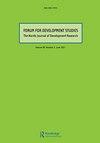动力动力转换?民间社会组织在莫桑比克采掘业政策制定中的作用
IF 1.1
Q3 DEVELOPMENT STUDIES
引用次数: 0
摘要
2012年,莫桑比克政府在与民间社会组织(cso)协商后宣布修订采矿和石油法。在此之前,在Rovuma盆地发现了世界级的天然气储量,各方对透明度、公平分配收入和保护国家利益的要求越来越高。鉴于此,公民社会组织扮演了什么角色?他们是否对谈判进程产生了影响?还是说,协商只是一种加强阿萨德政权利益和合法性的工具?葛兰西和非洲学者将国家和公民社会概念化为相互关联的社会力量,通过权力平衡的转移相互影响。在此基础上,该研究揭示了公民社会组织通过履行以下四个基本角色来影响采矿和石油法的发展:专业知识、议程设置、代表和监督。政府满足了公民社会组织的一些要求,尽管征求意见的过程并不完全公开。调查结果建立在对公民社会组织成员的访谈和其他定性来源(法律、新闻和报道)的基础上,并强调有必要超越两分法和同质化的分类来分析国家和民间社会。他们还促成了关于公民社会在竞争性威权政权中的作用的大量文献。本文章由计算机程序翻译,如有差异,请以英文原文为准。
Shifting Power Dynamics? The Role of Civil Society Organizations in the Policymaking for Mozambique’s Extractive Sector
Abstract In 2012 the Mozambican government announced the revision of the mining and petroleum laws in consultation with civil society organizations (CSOs). This followed the discovery of world class gas reserves in the Rovuma Basin, and growing demands for transparency, fair sharing of revenues and protection of national interests, from all quadrants. Given this, what was the role played by CSOs? Did they influence the process at all, or did the consultation serve as a tool to strengthen the regime’s interests and legitimacy? Building on Gramsci and African scholarship that conceptualizes the state and civil society as relational social forces that co-influence each other through shifting power balances, the study reveals that CSOs influenced the development of the mining and petroleum laws by performing four essential roles: expertise, agenda-setting, representative and monitoring. The government accommodated some of CSOs demands, even though the consultation process was not fully open. The findings build on a mix of interviews with members of CSOs and other qualitative sources (laws, news and reports) and underline the need to analyse state and civil society beyond dichotomous and homogenizing categories. They also contribute to a flourishing literature on the role of civil society in competitive authoritarian regimes.
求助全文
通过发布文献求助,成功后即可免费获取论文全文。
去求助
来源期刊

FORUM FOR DEVELOPMENT STUDIES
DEVELOPMENT STUDIES-
CiteScore
1.80
自引率
14.30%
发文量
24
期刊介绍:
Forum for Development Studies was established in 1974, and soon became the leading Norwegian journal for development research. While this position has been consolidated, Forum has gradually become an international journal, with its main constituency in the Nordic countries. The journal is owned by the Norwegian Institute of International Affairs (NUPI) and the Norwegian Association for Development Research. Forum aims to be a platform for development research broadly defined – including the social sciences, economics, history and law. All articles are double-blind peer-reviewed. In order to maintain the journal as a meeting place for different disciplines, we encourage authors to communicate across disciplinary boundaries. Contributions that limit the use of exclusive terminology and frame the questions explored in ways that are accessible to the whole range of the Journal''s readership will be given priority.
 求助内容:
求助内容: 应助结果提醒方式:
应助结果提醒方式:


